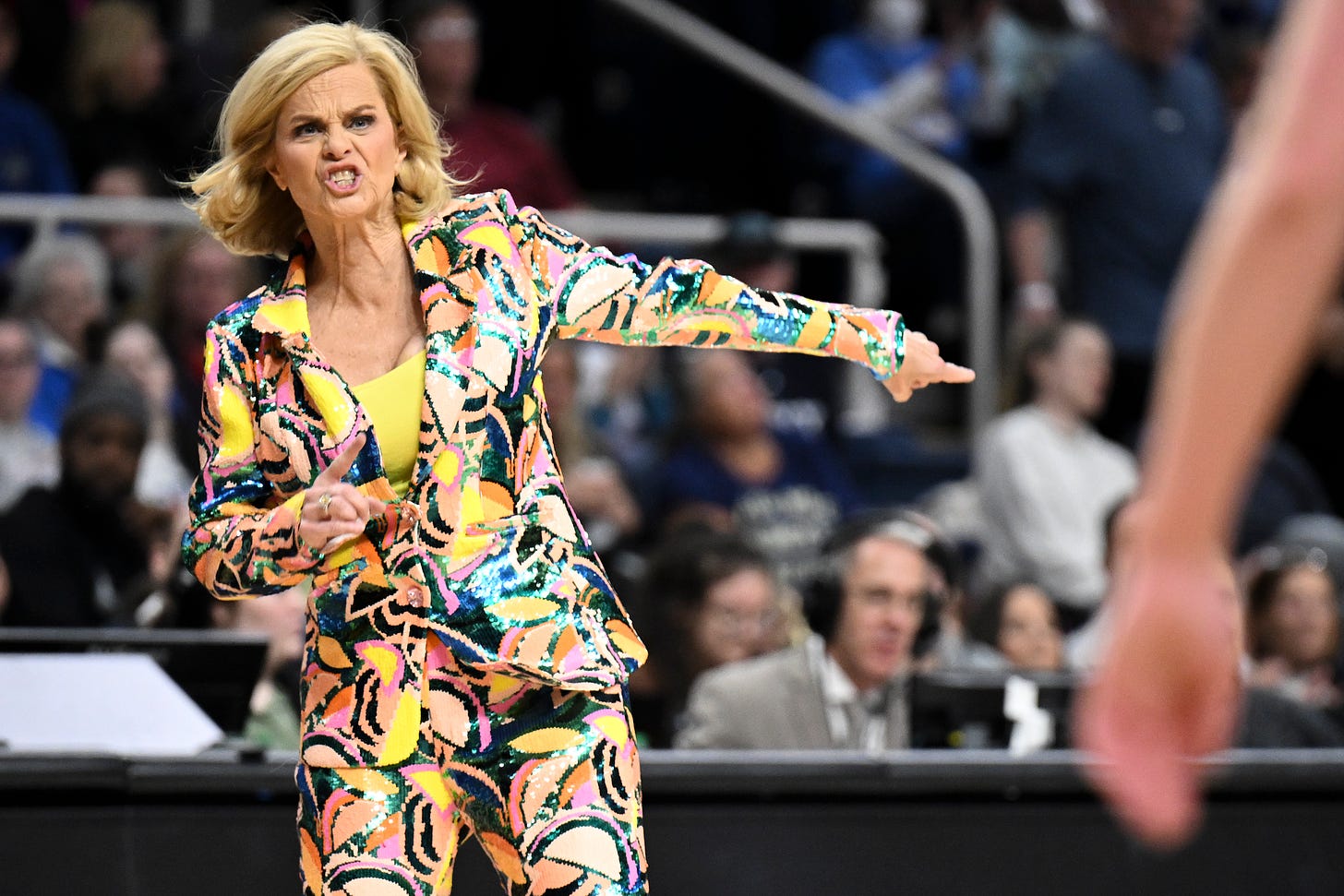Kim Mulkey, other coaches, do not get it or choose not to

The Kim Mulkey story dropped.
The Washington Post’s Kent Babb wrote it.
On the off chance you pay for the Post, or have access to the account of one who does, clear some time. Listening to it on the Post’s website only takes 39 minutes.
It’s the story Mulkey, the former Baylor coach and current skipper of defending national champion LSU, described as a "hit piece" prior to arrival, the one she lambasted the newspaper for only giving her a few days to respond to after she’d spent two years refusing interview requests, the one whose author, Babb, she's called “a sleazy reporter.”
It arrived Saturday under the digital headline: “The Kim Mulkey Way: The LSU coach holds grudges, battles everyone - and keeps winning. But at what cost?”
Sunday, it arrived in print.
It’s datelined “TICKFAW, La.,” the town near which Mulkey and her sister Tammy grew up, where the 86-year-old father Mulkey’s not spoken to in 37 years built a swimming pool, softball diamonds and a basketball court for his daughters to play in and upon on inherited farmland.
Mulkey’s father, Les, is no saint.
He cheated on Dru, Mulkey’s mother, eventually left Dru and married another woman, reports Babb, “[not] much older than Tammy and Kim.”
Nor are Kim and Tammy speaking.
There’s that.
And more.
When Mulkey sought to move up from assistant to head coach at Louisiana Tech, her alma mater, university president Dan Reneau offered her the job and a three-year contract. Mulkey asked, pleaded and, literally, cried for a five-year commitment, but Reneau didn't budge.
She has not spoken to him again, either.
There are the relationships with her players, too. Some defend her. Some don’t. She gets personal with them, and not in a nice way, willing to use shame as a motivator.
Players who are gay and out, like Brittney Griner and Kelli Griffin, believe she treated them differently than other players and both offer convincing cases.
Mulkey thought late Tennessee coach Pat Summitt to be the standard and her best friend in the profession, their relationship first taking hold when Summitt refused to cut Mulkey from the 1984 U.S. Olympic team despite Mulkey suffering a broken foot, rendering her unavailable.
The story goes on.
Mulkey will go places other coaches won’t to scavenge her players’ and team’s performative best.
Perhaps she goes too far.
Eye of the beholder.
It’s a fabulously reported and interesting story and not remotely a hit piece.
But forgive Mulkey, who knows not the first thing about journalism, nor cares to, nor is unique among coaches feeling that way.
Interviewed by ESPN Saturday, Mulkey responded to the story’s publication.
“You’re telling me something I didn’t know … But are you really surprised,” she said. “Are you really surprised by the timing of it.”
But of course it came out Saturday. The Post can’t count on LSU returning to the Final Four. Even waiting until the Tigers reached the Sweet 16 was a risk.
The Post, like any newspaper, is in the getting-readers-to-read-the-story business. When was it supposed to run it, July?
But that’s lost on Mulkey.
Unless it isn’t but it serves her to act as though it is.
Bob Stoops, who did not have a warm and fuzzy relationship with his coverers, still realized they had a job to do and said so often. Too bad Mulkey and varioius other coaches have no such understanding.
Here’s a sentence from Babb’s story:
Through her attorneys, Mulkey derided The Post for contacting family members, saying they did not “relate in any way to her career.”
Seriously?
Her family did not help shape her, good or bad, into the adult and coach she’s become?
Though family members freely spoke to Babb, he’s not supposed to use it because it doesn’t “relate in any way to her career.”
Mulkey, not Babb, knows Babb’s job better than Babb?
Former ESPN personality Jemele Hill, who made her bones at The Detroit Free Press, who now contributes to The Atlantic,” tweeted this Saturday:
I’m about to read this Kim Mulkey story but once I knew who the writer was, I knew it wasn’t going to be a “hit piece.” Kent Babb is an excellent writer who mainly seems to write introspective profiles … [Mulkey’s] issue was — and she isn’t the first public figure to think this way — he’s not following the narrative I want him to follow.
Bingo.
It’s a bad story because it’s not the story Mulkey wants written about herself and her program and, yes, it’s the height of self-centeredness.
Too many coaches believe it’s the media’s privilege, not their jobs, to cover them and their teams. And because it’s a privilege, reporters should take a coach’s word for it that something’s important or not, as though that coach is singularly devoted to the truth, never self interest. As though Lincoln Riley and Southern Cal, after no contact, magically agreed to join forces about 12 hours after the Sooners lost in Stillwater.
Here’s the truth.
Though media and a coach’s or program’s interests may frequently intersect, occasionally completely, that intersection remains incidental, not by design.
Coaches and programs are out for themselves, protective of their interests, which is fine. Media should deal in truth, accuracy and the interest of their readers and viewers rather than their subjects. It’s helpful when each respects the other.
Further, Kim Mulkey is not just a basketball coach, but a cultural force. She’s fascinating, visceral, polarizing and leaves the masses discussing her, with or without Kent Babb and The Washington Post’s help, making her a fantastic subject for exactly the type of story Babb wrote.
Perhaps she doesn’t get it.
Or does but claims not to.
She’ll live.
The rest of us can read a great story.


